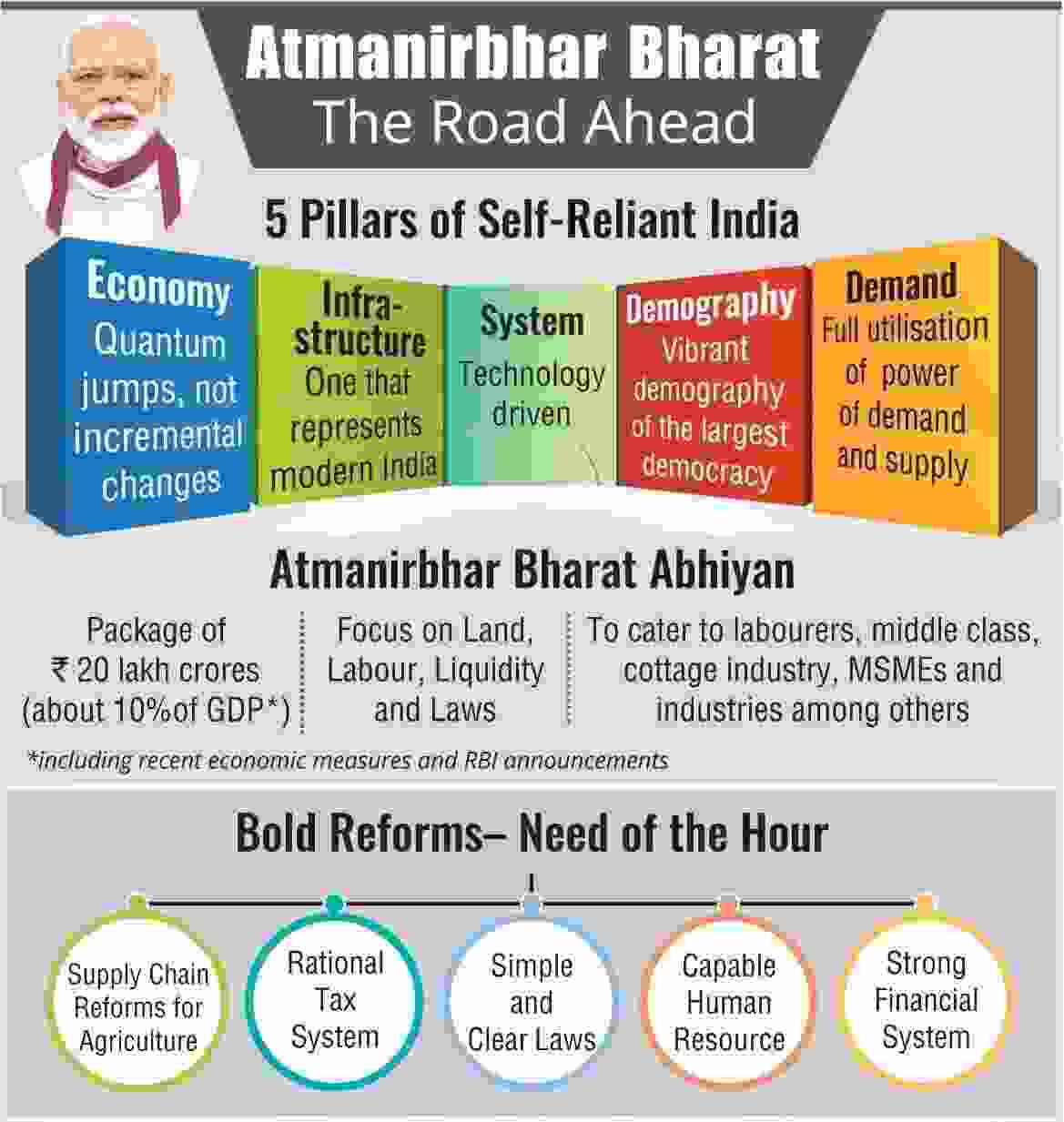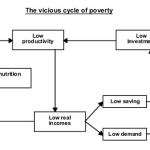Atma Nirbhar Bharat Abhiyan
With the aim of promoting self-reliance, the Aatma Nirbhar Bharat is a Rs 20 lakh crore stimulus to the Indian economy coupled with sweeping reforms in various sectors.

The package was unveiled by finance minister Nirmala Sitharaman over a series of five days, giving detailed focus on farmers, MSME, poor and migrants, encouraging privatization and reform
Agriculture Reforms
- APMC Era to End– A new Central law will allow farmers to sell produce at attractive price; barrier-free Inter-State Trade and robust framework for e-trading. This will end the monopoly of APMCs where the farmers were forced to sell produce at unattractive prices
- Essential Commodities Act Amended– Cereals, pulses, oilseeds, edible oils, potato and onion taken out of ECA. This will ensure proper selling, avoid distress sales and encourage storage infrastructure in India
- Contract Farming to become a reality. This will directly lead to income increase for farmers.
- Rs 1 lakh crore Agriculture Infrastructure Fund will help set up cold chain & Post Harvest Management (PHM) infrastructure
- Rs 20,000 crore PM Matsya Sampada Yojana will help build fisheries value chain. India’s 7,500 km coastline will now help fishermen earn a livelihood
- To help small and marginal farmers, an investment of Rs. 10,000 crores over next 5 years will help in formalization of 2 lakh unorganized micro food processing units with better integration of their products with retail markets
- Animal Husbandry Infrastructure Fund of Rs 15,000 crore, set up through NABARD, will promote private investment in dairy processing, value addition and cattle feed infrastructure.
Announcements for MSMEs
- MSMEs get Rs 3 lakh crore collateral-free automatic business loans which will help 45 lakh enterprises to sustain production, buy raw materials and save jobs for labour
- Rs 20,000 crore will be given to NPA ridden MSMEs coupled with credit guarantee. The banks will get equity share in MSMEs
- Rs 50,000 crore Fund of Funds will be created to fund MSMEs who find it difficult to raise money. It will have Rs 10,000 crore government support and rest would be pooled from private sector
- MSMEs get a new definition based on two parameters- Investment and Turnover. MSMEs can now avail better benefits through this new definition
- To support local production, any global bidder is barred from bidding for government tenders up to Rs 200 crore. MSMEs can now compete in supplying goods to the government
Announcements for Migrants and Poor
- Migrants who are neither covered under National Food Security Act nor are state card beneficiaries, will now be provided 5 kg of grains per person and 1 kg Chana per family per month for two months
- To access food benefits anywhere in the nation, One Nation One Ration Card will be fully operationalized till March 2021
- Affordable Rental Housing Complexes will be built on government land to provide affordable housing to migrants in cities
- The 24% contribution to the EPF of labour has been extended further till August 2020 benefiting 72.22 lakh employees
- Rs 10,000 working capital will also be given to street vendors to support the supply chain in the cities. 50 lakh street vendors will benefit from Rs 5,000 crore fund
- Additional Rs 40,000 crore will be spent on MGNREGA to generate 300 crore person days to kickstart the rural economy
- Rs 6,000 crore CAMPA funds will be used to boost forest infrastructure in the tribal areas, thereby generating employment for tribal.
Reforms Agenda
- Coal Mining is now open for private sector participation. Private companies can now participate in commercial coal mining
- Apart from 500 new mines, joint auction of bauxite and coal mines will strengthen aluminum industry
- FDI limit in the defense manufacturing under automatic route will be raised from 49% to 74% for promote investments in India
- Defense Airspace will be opened up for civilian use. This would not only lead to a cost saving of Rs 1000 crore for the civil aviation industry, but will also reduce the oil import bill, save time of travelers and will be environment friendly
- 6 new airports will be developed on PPP basis, taking the total private investment to Rs 13,000 crore
- In atomic energy sector, PPP mode will be used to set up experimental reactors as well as facilities for irradiation of food for preservation
- Power Utilities in Union Territories will be privatized. This will lead to better service to consumers and improvement in operational and financial efficiency in distribution

















